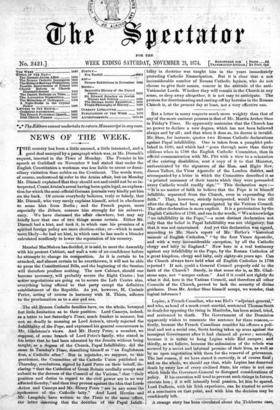But a letter in many respects much more weighty than
that of any of the more eminent persons is that of Mr. Martin Archer Shee in Friday's Times. He apparently maintains that the Church has no power to declare a new dogma, which has not been believed always and by all ; and that when it does so, its decree is invalid. Mr. Shee, for instanee, quotes two Roman Catholic declarations against Papal infallibility. One is taken from a pamphlet pub- lished in 1680, and which had "gone through more than thirty editions when in 1788 the English Catholic Committee, then in official communication with Mr. Pitt with a ;view to a relaxation of the existing disabilities, sent a copy of it to that Minister, authenticated by the signature of the Hon. and Right Rev. James Talbot, the Vicar Apostolic of the London district, and accompanied by a letter in which the Committee described it as a printed summary of their tenets which they were persuaded every Catholic would readily sign." This declaration says :— " It is no matter of faith to believe that the Pope is in himself infallible, separated from the Church, even in expounding the faith." That, however, strictly interpreted, would be true till after. the dogma had been promulgated by the Vatican Council. The other declaration is more explicit. It is a protestation by the English Catholics of 1788, and ran in the words, "We acknowledge "no infallibility in the Pope;"—a most distinct declaration not only that the belief in Papal Infallibility was not obligatory, but that it was not entertained. And yet this declaration was signed, according to Mr. Slice's report. of Mr. • Butler's "historical memoir of English Catholics," "by the four Vicars Apostolic, and with a very inconsiderable exception, by all the Catholic clergy and laity in England." Now here is a real testimony against any infallibility in the Pope, by the Roman Catholics of a great kingdom, clergy and laity, only eighty-six years ago. Can the Church always have held what all English Catholics in 1788 rejected ? If not, could a General Council properly add to the faith of the Church? Surely, in that sense she is, as Mr. Glad- stone says, not " semper eadem." And if it could not rightly do what it did, here is the Vatican Council, and therefore all other Councils of the Church, proved to lack the security of divine guidance. Does Mr. Archer Shee himself accept, we wonder, that logical inference ?


































